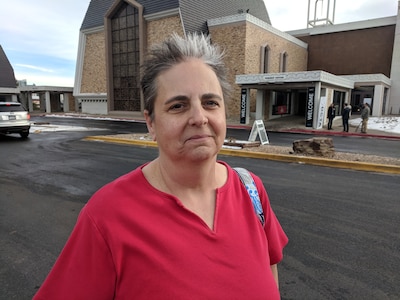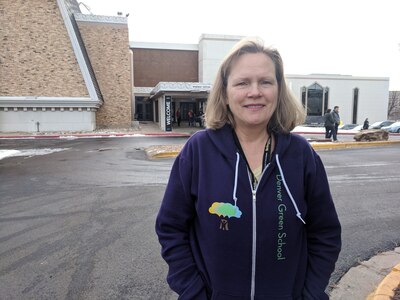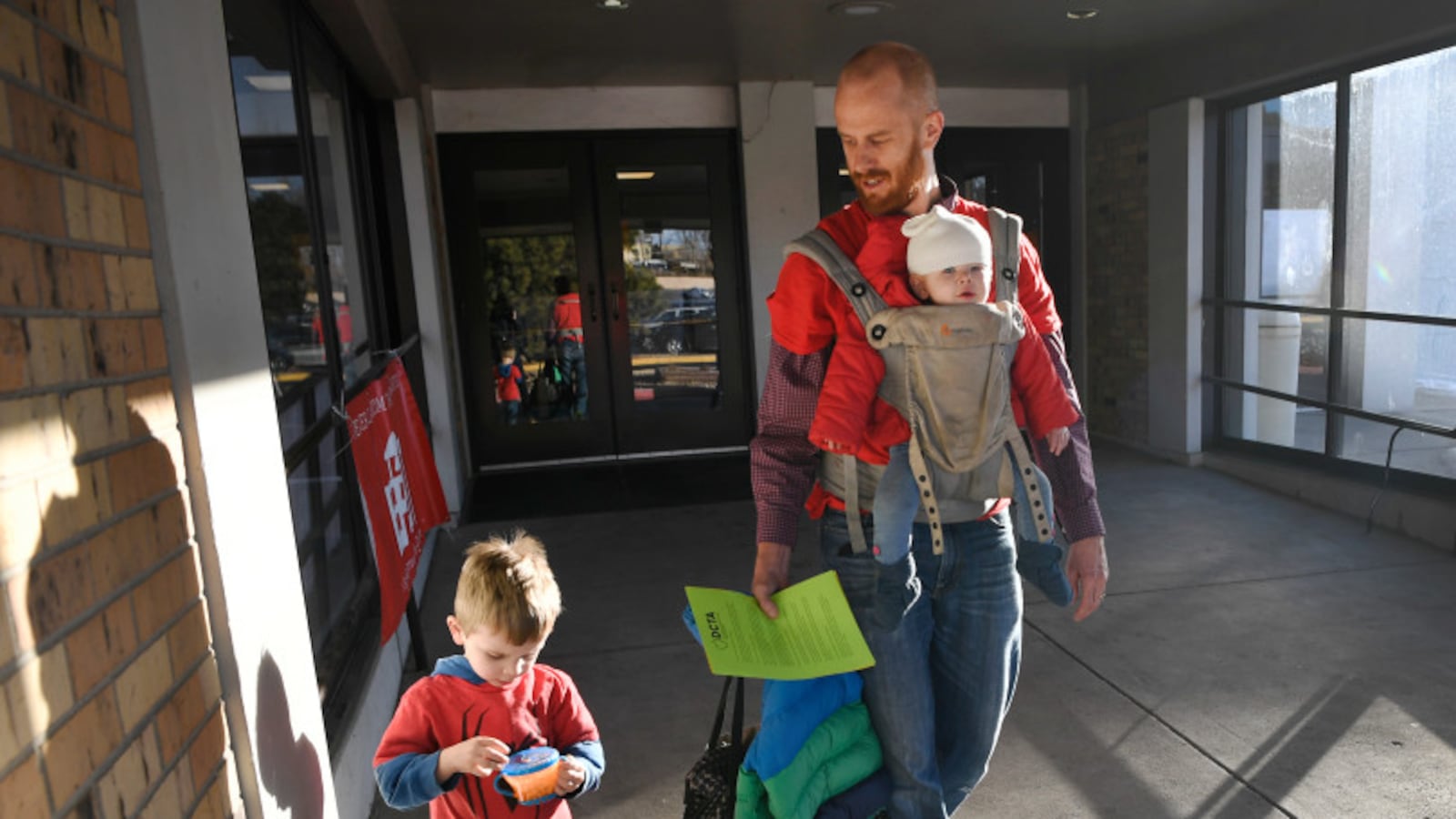Throughout the day, the parking lot of Riverside Baptist Church filled up as Denver teachers made their way into a meeting organized by their union, the Denver Classroom Teachers Association.
Months of negotiations that failed to produce a deal between top leaders of Denver Public Schools and the union had given way to individual teachers facing a choice: To strike or not?
Along with reporting the news of the day — which you can read about here — Chalkbeat spent time visiting with teachers to get a sense of what was shaping their decision-making.
Most teachers we spoke with, both in depth and in passing, said they voted “yes” to strike. Union officials have said two-thirds of those who vote Saturday and in a second session Tuesday must sign off on a strike for it to proceed, and the prevailing wisdom among teachers we interviewed was that support is strong.
The decision, though, is far from black and white for many teachers, regardless of where they ultimately land.
Here are the stories of three teachers, all at different places:
Krista Skuce, Slavens K-8 school: Yes to strike
At the urging of teachers and parents, Slavens K-8 students turned out early on a few recent mornings to show support for their teachers. They wore red in solidarity and posed for pictures.
They also brought questions. “Why are you doing this?” was one.
Krista Skuce, a physical education teacher and 14-year Denver Public Schools employee, would tell students that she lives 40 minutes from the school because she can’t afford to live in Denver.

But there is more to her story. Her spouse, she said, is no longer able to work, beset by medical issues, unable to draw disability benefits, and in need of costly care including massage therapy, chiropractic appointments, neuromuscular therapies, and more.
At the same time, Skuce said her pay “doesn’t seem to be going anywhere.” So she hustles, earning extra pay by driving across town to coach softball and basketball.
Skuce, like many teachers who stopped to talk about their votes on Saturday, believes the district can do more to boost teachers’ base pay — before bonuses and incentives.
She said her salary has only increased $4,000 or $5,000 in the past 14 years, even though she has been teaching 27 years, has a master’s degree, and is National Board Certified.
Skuce said she knows that by voting to strike, she could very well end up taking money out of her own bank account. Striking teachers don’t get paychecks.
“I am hoping the district and the DCTA do the right thing and recognize the fact that there are some people here who are on the edge,” she said. “We are on the edge emotionally, financially. We know these are good people. And I think teachers are people who wake up every morning with forgiveness.
“You have to take a stand and say what you are for at some point in time in your life — and this is it,” she said. “I’m willing to do it, scary or not.”
Jason Clymer, John F. Kennedy High School: No to strike
An English teacher at John F. Kennedy High School, Jason Clymer stands with his fellow union members in the belief teachers aren’t paid enough. He finds fault with what is asked of teachers through LEAP, the district’s growth and performance system for teachers.
“Teachers at my school feel extremely micromanaged and can’t catch a breath,” he said.
But in the end, after being one of the first teachers in the door Saturday and attending an information session, Clymer said he voted against the strike.
“Going on strike is very hard,” said Clymer, whose wife works in human resources for the district’s central office. “And I think the agreement DPS came to was close enough.”
Clymer questioned picking a fight now because of the limited scope of the negotiations. That would be the current agreement governing ProComp, the pay system that provides teachers one-time bonuses for things like teaching in a high-poverty school, getting strong evaluations, having students who earn high test scores, or teaching in a high-performing school.
He said he’d like to save some political leverage to focus on other issues covered by the district’s main contract with the union.
“It’s really unfortunate these things can’t all be negotiated together,” he said. “If the district came out and said, ‘We want to give you more money, not as much as you like, but we want to devote more to things like mental health services,’ I really think that would be a winning argument.”
In opposing a strike, Clymer said that he did not want to divide his fellow teachers.
“Although I voted no, I believe in the union,” he said. “And if the union voted to strike, I will absolutely support the union.”
Paula Zendle, Denver Green School: Undecided about strike
Paula Zendle is dreading the moment that is appearing increasingly likely: standing before her students at the Denver Green School and explaining why she won’t be there to teach them.
“I tell them constantly, ‘Don’t miss school, don’t miss school. Don’t be absent, don’t be absent, don’t be absent,’” said Zendle, her eyes welling up with tears as she waited on a friend. “I have been fighting to avoid a strike. I hate this. It’s utterly and totally agonizing to me.”

Zendle said she left a career in the corporate world for the classroom and has been teaching eight years. She teaches English language acquisition and Spanish at the Green School, a popular and highly-rated middle school option in a district that celebrates choice.
Zendle said she has done her research and written to the district’s chief financial officer. What bothers her is a system she believes rewards younger teachers and underpays teachers in terms of the cost of living.
The average Denver teacher currently earns about $51,000 in base pay and $57,000 with incentives, according to data from the state education department and the district. That’s less than teachers in districts like Boulder Valley, Cherry Creek, and Littleton.
District officials have agreed to put $20 million more into teacher compensation and defended their most recent offer on Saturday as “compelling.”
For Zendle, the prospect of facing her students — and that she works in a supportive school environment — is contributing to her struggle in deciding whether to vote “yes” to strike.
So if the moment does come, what will she tell her students?
“We have the right to protest unfair taxpayer spending,” she said. “This is not only unfair, it’s unconscionable. Their priorities have been wrong for 10 years.”
Then she paused and made clear that her decision had not been made. She considers herself a person of principle, and that will guide her in making a decision.

